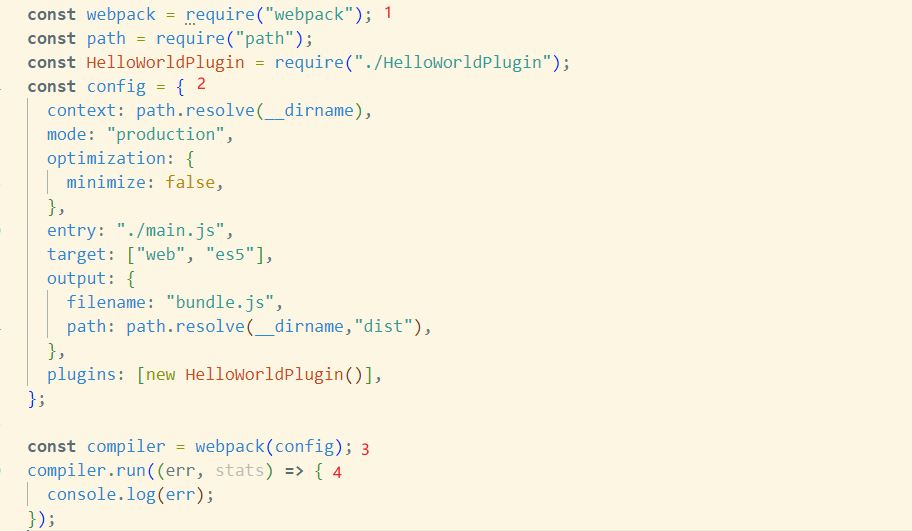

【前端必会】tapable、hook,webpack的灵魂 - 李同学的教室
source link: https://www.cnblogs.com/lee35/p/16743594.html
Go to the source link to view the article. You can view the picture content, updated content and better typesetting reading experience. If the link is broken, please click the button below to view the snapshot at that time.
【前端必会】tapable、hook,webpack的灵魂
- 什么是tapable、hook,平时做vue开发时的webpack 配置一直都没弄懂,你也有这种情况吗?
- 还是看源码,闲来无聊又看一下webpack的源码,看看能否找到一些宝藏
- tapable和webpack没有特定关系,可以先看下这篇文章,了解下这个小型库
https://webpack.docschina.org/api/plugins/#tapable
https://blog.csdn.net/mafan121/article/details/113120081
4.下面记录下寻宝过程
执行一次webpack经历了什么,先看一下代码

我们分析一下4点
- 引用了webpack
- 我们使用的配置文件
- 调用webpack函数,传入配置,返回一个compiler(编译器)
- 执行编译器的run方法
引用webpack,先把这个函数找出来
https://github.com/webpack/webpack/blob/main/package.json "main": "lib/index.js",
https://github.com/webpack/webpack/blob/main/lib/index.js
module.exports = mergeExports(fn, {
get webpack() {
return require("./webpack");
},
https://github.com/webpack/webpack/blob/main/lib/webpack.js
const webpack = /** @type {WebpackFunctionSingle & WebpackFunctionMulti} */ (
/**
* @param {WebpackOptions | (ReadonlyArray<WebpackOptions> & MultiCompilerOptions)} options options
* @param {Callback<Stats> & Callback<MultiStats>=} callback callback
* @returns {Compiler | MultiCompiler}
*/
(options, callback) => {
const create = () => {
if (!asArray(options).every(webpackOptionsSchemaCheck)) {
getValidateSchema()(webpackOptionsSchema, options);
util.deprecate(
() => {},
"webpack bug: Pre-compiled schema reports error while real schema is happy. This has performance drawbacks.",
"DEP_WEBPACK_PRE_COMPILED_SCHEMA_INVALID"
)();
}
/** @type {MultiCompiler|Compiler} */
let compiler;
let watch = false;
/** @type {WatchOptions|WatchOptions[]} */
let watchOptions;
if (Array.isArray(options)) {
/** @type {MultiCompiler} */
compiler = createMultiCompiler(
options,
/** @type {MultiCompilerOptions} */ (options)
);
watch = options.some(options => options.watch);
watchOptions = options.map(options => options.watchOptions || {});
} else {
const webpackOptions = /** @type {WebpackOptions} */ (options);
/** @type {Compiler} */
compiler = createCompiler(webpackOptions);
watch = webpackOptions.watch;
watchOptions = webpackOptions.watchOptions || {};
}
return { compiler, watch, watchOptions };
};
if (callback) {
try {
const { compiler, watch, watchOptions } = create();
if (watch) {
compiler.watch(watchOptions, callback);
} else {
compiler.run((err, stats) => {
compiler.close(err2 => {
callback(err || err2, stats);
});
});
}
return compiler;
} catch (err) {
process.nextTick(() => callback(err));
return null;
}
} else {
const { compiler, watch } = create();
if (watch) {
util.deprecate(
() => {},
"A 'callback' argument needs to be provided to the 'webpack(options, callback)' function when the 'watch' option is set. There is no way to handle the 'watch' option without a callback.",
"DEP_WEBPACK_WATCH_WITHOUT_CALLBACK"
)();
}
return compiler;
}
}
);
module.exports = webpack;
这里主要就是调用create创建一个Compiler(先不理watch)

在看一下create,这里是调用的createCompiler或者createMultiCompiler

在看一下createCompiler,这里主要就是new一个Compiler。这个时候已经开始了webpack编译的生命周期。
/**
* @param {WebpackOptions} rawOptions options object
* @returns {Compiler} a compiler
*/
const createCompiler = rawOptions => {
const options = getNormalizedWebpackOptions(rawOptions);
applyWebpackOptionsBaseDefaults(options);
const compiler = new Compiler(options.context, options);
new NodeEnvironmentPlugin({
infrastructureLogging: options.infrastructureLogging
}).apply(compiler);
if (Array.isArray(options.plugins)) {
for (const plugin of options.plugins) {
if (typeof plugin === "function") {
plugin.call(compiler, compiler);
} else {
plugin.apply(compiler);
}
}
}
applyWebpackOptionsDefaults(options);
compiler.hooks.environment.call();
compiler.hooks.afterEnvironment.call();
new WebpackOptionsApply().process(options, compiler);
compiler.hooks.initialize.call();
return compiler;
};
我们简单看一下Compiler类的一些hooks
const {
SyncHook,
SyncBailHook,
AsyncParallelHook,
AsyncSeriesHook
} = require("tapable");
......
class Compiler {
/**
* @param {string} context the compilation path
* @param {WebpackOptions} options options
*/
constructor(context, options = /** @type {WebpackOptions} */ ({})) {
this.hooks = Object.freeze({
/** @type {SyncHook<[]>} */
initialize: new SyncHook([]),
/** @type {SyncBailHook<[Compilation], boolean>} */
shouldEmit: new SyncBailHook(["compilation"]),
/** @type {AsyncSeriesHook<[Stats]>} */
done: new AsyncSeriesHook(["stats"]),
/** @type {SyncHook<[Stats]>} */
afterDone: new SyncHook(["stats"]),
/** @type {AsyncSeriesHook<[]>} */
additionalPass: new AsyncSeriesHook([]),
/** @type {AsyncSeriesHook<[Compiler]>} */
beforeRun: new AsyncSeriesHook(["compiler"]),
/** @type {AsyncSeriesHook<[Compiler]>} */
run: new AsyncSeriesHook(["compiler"]),
/** @type {AsyncSeriesHook<[Compilation]>} */
emit: new AsyncSeriesHook(["compilation"]),
/** @type {AsyncSeriesHook<[string, AssetEmittedInfo]>} */
assetEmitted: new AsyncSeriesHook(["file", "info"]),
/** @type {AsyncSeriesHook<[Compilation]>} */
afterEmit: new AsyncSeriesHook(["compilation"]),
每个hook都是一个 tapable包里对应后hook的实例
在回到创建编译器那里,这时创建一个插件的实例,并且执行apply方法,插件就会向自己关系的hook添加事件处理函数(其实还是一个事件监听),NodeEnvironmentPlugin代码可以自行在源码中查看
new NodeEnvironmentPlugin({
infrastructureLogging: options.infrastructureLogging
}).apply(compiler);
一切都准备好了之后,我们再看一下编译器的run方法
/**
* @param {Callback<Stats>} callback signals when the call finishes
* @returns {void}
*/
run(callback) {
if (this.running) {
return callback(new ConcurrentCompilationError());
}
let logger;
const finalCallback = (err, stats) => {
if (logger) logger.time("beginIdle");
this.idle = true;
this.cache.beginIdle();
this.idle = true;
if (logger) logger.timeEnd("beginIdle");
this.running = false;
if (err) {
this.hooks.failed.call(err);
}
if (callback !== undefined) callback(err, stats);
this.hooks.afterDone.call(stats);
};
const startTime = Date.now();
this.running = true;
const onCompiled = (err, compilation) => {
if (err) return finalCallback(err);
if (this.hooks.shouldEmit.call(compilation) === false) {
compilation.startTime = startTime;
compilation.endTime = Date.now();
const stats = new Stats(compilation);
this.hooks.done.callAsync(stats, err => {
if (err) return finalCallback(err);
return finalCallback(null, stats);
});
return;
}
process.nextTick(() => {
logger = compilation.getLogger("webpack.Compiler");
logger.time("emitAssets");
this.emitAssets(compilation, err => {
logger.timeEnd("emitAssets");
if (err) return finalCallback(err);
if (compilation.hooks.needAdditionalPass.call()) {
compilation.needAdditionalPass = true;
compilation.startTime = startTime;
compilation.endTime = Date.now();
logger.time("done hook");
const stats = new Stats(compilation);
this.hooks.done.callAsync(stats, err => {
logger.timeEnd("done hook");
if (err) return finalCallback(err);
this.hooks.additionalPass.callAsync(err => {
if (err) return finalCallback(err);
this.compile(onCompiled);
});
});
return;
}
logger.time("emitRecords");
this.emitRecords(err => {
logger.timeEnd("emitRecords");
if (err) return finalCallback(err);
compilation.startTime = startTime;
compilation.endTime = Date.now();
logger.time("done hook");
const stats = new Stats(compilation);
this.hooks.done.callAsync(stats, err => {
logger.timeEnd("done hook");
if (err) return finalCallback(err);
this.cache.storeBuildDependencies(
compilation.buildDependencies,
err => {
if (err) return finalCallback(err);
return finalCallback(null, stats);
}
);
});
});
});
});
};
const run = () => {
this.hooks.beforeRun.callAsync(this, err => {
if (err) return finalCallback(err);
this.hooks.run.callAsync(this, err => {
if (err) return finalCallback(err);
this.readRecords(err => {
if (err) return finalCallback(err);
this.compile(onCompiled);
});
});
});
};
if (this.idle) {
this.cache.endIdle(err => {
if (err) return finalCallback(err);
this.idle = false;
run();
});
} else {
run();
}
}
https://github.com/webpack/webpack/blob/main/lib/Compiler.js
这里简单分析一下,主要就是执行run相关生命周期,以及编译。并且编译完成后传入回调函数onCompiled
const run = () => {
this.hooks.beforeRun.callAsync(this, err => {
if (err) return finalCallback(err);
this.hooks.run.callAsync(this, err => {
if (err) return finalCallback(err);
this.readRecords(err => {
if (err) return finalCallback(err);
this.compile(onCompiled);
});
});
});
};
整体逻辑不是很复杂,我们主要可以感受到webpack启动后对hook的一些使用方式。整体的逻辑差不多都是一样的。是不是很简单。
- 想了解一个框架,一定要找到入口函数,一点一点向前探索。
- tapable 是个好东西,
- 关于webpack生命周期,有疑问的时候,除了看文档意外,还可以结合源码去理解,去感受
你学会了吗?欢迎留下你的感受!
Recommend
About Joyk
Aggregate valuable and interesting links.
Joyk means Joy of geeK